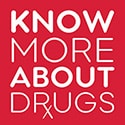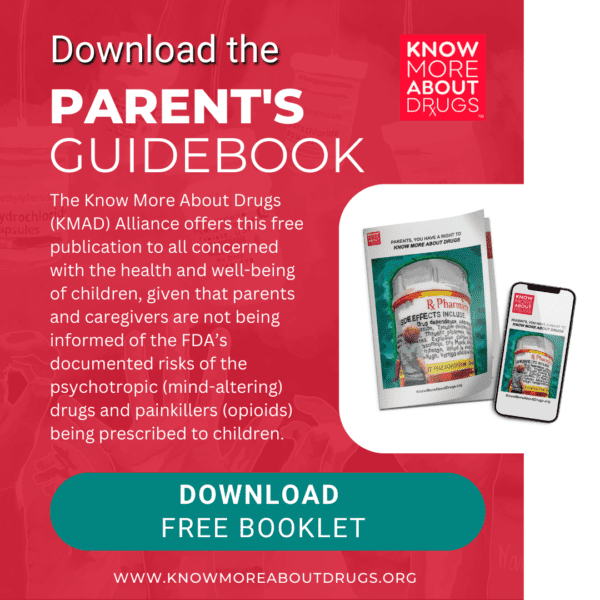Why I support the Alliance to empower parents with documented risks of prescribed psychotropic drugs on children
This will be my first-ever blog article, and it is with great humility that I am allowed to be an Alliance Member to “Know More About Drugs” (KMAD). First, let me provide you a little background about me.
I am a licensed clinical psychologist (in Wisconsin), a former Chief Psychologist for the Dept. of Corrections in WI, a former disability examiner for Social Security Administration, the past Executive Director of the International Society for Ethical Psychology and Psychiatry and the former Clinical Director of a doctoral training program here in WI. I have expertise in long-term psychotropic drug outcome studies, forensic clinical psychology and working with children and young adults. I have provided written testimony and research to the FDA—helping establish the Black Box warning labels on SSRI antidepressants—been an invited guest speaker to both the United States Congress and Senate of Mexico—speaking about psychiatric drug induced violence and suicide in children and young adults—and I conduct treatment consultations throughout the country. My wife and I also have been together for 32 years and have two wonderful teenagers who are having to navigate the challenges of our society.
Knowledge about KMAD is so greatly needed, as it literally saves the lives of children, teens and their families.
KMAD is about information and informed consent. It is empowering parents by giving them the knowledge and facts, right from the FDA, about the risks of psychotropic drugs being recommended for their child. These FDA Medication Guides (MedGuides) and information they provide, alert parents to the fact that many of these drugs may increase the symptoms they want to reduce, may create new severe adverse reactions, may create dependence, and may cause their child to commit suicide and acts of violence if left unchecked – and without much notice. According to Jim Gottstein, Harvard graduate attorney, “These facts are virtually never disclosed to patients, thus breaching the obligation to obtain informed consent, and often legally constituting battery.”
It is empowering parents by giving them the knowledge and facts, right from the FDA, about the risks of psychotropic drugs being recommended for their child.
I hope you find this blog informative and enjoyable. I will be sharing research, information about how mind-altering psychotropic drugs impact psychological development, a few personal stories and photos, and certainly my own emotional reactions to both success stories and tragedies currently happening. Future blogs will feature at least a few article topics and or facts that parents and readers can use in their own lives, and with their own children. I look forward to us getting to Know More About Drugs…together!
So let’s start off with something positive. I referred a mother to the Know More About Drugs website about a month ago, as she had numerous questions about whether certain prescribed drugs could cause the unusual behavior she was seeing in her son. She indicated that she had already called the prescribing doctor and could not get in to see him for over a month. The mother said that a nurse who spoke to her, indicated the medications her son was taking would not be causing her son to exhibit the behavior she was starting to see. When she heard about the work that I do, she contacted me and I was able to refer to her the FDA Medication Guides through the KMAD website, so she could learn right from the source. The child had originally been seen for problems with test-taking and “blanking out” in school. He was placed on Adderall, and then months later when he was not eating much, becoming aggressive, not sleeping well and having arguments that led to crying, he was prescribed Prozac, reportedly for depression. All the behavioral and emotional problems began to increase months later, and the mother questioned if the medications could have been causing the worsening of “symptoms” (i.e. behaviors, thoughts and feelings).
Upon reading the Medication Guides on both Adderall and Prozac, she realized that all the concerning behaviors and worsening thoughts could be caused by the very medications her doctor was recommending to increase (per her son’s last appointment).
Now, I would love to say that the story was simple and the mother took this new information, got her son off the drugs, and all the bad stuff went away, but that is not what happened. Instead, the mother did research on how to taper him off the medications, began doing this against my advice, as it is vital to have an MD supervising any such changes in medications, and subsequently she began to see her son becoming even more aggressive, have worsening sleep problems and worsening behavior in school. However, the mom knew this might occur because these medications can cause dependence—both psychologically and physiologically, so she persevered in tapering off the medications. I am happy to say that a few months later, her son was off all medications, was working with a counselor and doing Mindfulness skill training and Nurtured Heart techniques. He was also sleeping well through the night, not showing any verbal or behavioral aggression, and getting great daily teacher feedback.
Had it not been for this mother doing her own research, with the help of KMAD, this child may have been just another child that I get to see in residential care, a group home, the prison system or in a hospital. This is not meant to be alarming, as I unfortunately hear story after story of an initial positive response, followed by a progressive worsening of living for so many children.
That said, I want to reiterate that any parents who are considering taking their child off any psychotropic drug, only do so under doctor’s supervision, as withdrawal from these drugs can range from mild to severe.
I am thrilled that KMAD is here to assist parents in learning more about the drugs being recommended for their child. Having the ability to know this information before starting a recommended psychotropic mind-altering drug is so important.
Welcome to being a critical thinker, flexible and open-minded about the pros and cons of recommended psychotropic drugs. Knowing how a drug might impact your child increases your ability to make informed decisions and keep your family safe. Do your teens know this information? They should, as it is their bodies and futures.
Warmly,
“Dr. Toby”
Why I support the Alliance to empower parents with documented risks of prescribed psychotropic drugs on children
This will be my first-ever blog article, and it is with great humility that I am allowed to be an Alliance Member to “Know More About Drugs” (KMAD). First, let me provide you a little background about me.
I am a licensed clinical psychologist (in Wisconsin), a former Chief Psychologist for the Dept. of Corrections in WI, a former disability examiner for Social Security Administration, the past Executive Director of the International Society for Ethical Psychology and Psychiatry and the former Clinical Director of a doctoral training program here in WI. I have expertise in long-term psychotropic drug outcome studies, forensic clinical psychology and working with children and young adults. I have provided written testimony and research to the FDA—helping establish the Black Box warning labels on SSRI antidepressants—been an invited guest speaker to both the United States Congress and Senate of Mexico—speaking about psychiatric drug induced violence and suicide in children and young adults—and I conduct treatment consultations throughout the country. My wife and I also have been together for 32 years and have two wonderful teenagers who are having to navigate the challenges of our society.
Knowledge about KMAD is so greatly needed, as it literally saves the lives of children, teens and their families.
KMAD is about information and informed consent. It is empowering parents by giving them the knowledge and facts, right from the FDA, about the risks of psychotropic drugs being recommended for their child. These FDA Medication Guides (MedGuides) and information they provide, alert parents to the fact that many of these drugs may increase the symptoms they want to reduce, may create new severe adverse reactions, may create dependence, and may cause their child to commit suicide and acts of violence if left unchecked – and without much notice. According to Jim Gottstein, Harvard graduate attorney, “These facts are virtually never disclosed to patients, thus breaching the obligation to obtain informed consent, and often legally constituting battery.”
It is empowering parents by giving them the knowledge and facts, right from the FDA, about the risks of psychotropic drugs being recommended for their child.
I hope you find this blog informative and enjoyable. I will be sharing research, information about how mind-altering psychotropic drugs impact psychological development, a few personal stories and photos, and certainly my own emotional reactions to both success stories and tragedies currently happening. Future blogs will feature at least a few article topics and or facts that parents and readers can use in their own lives, and with their own children. I look forward to us getting to Know More About Drugs…together!
So let’s start off with something positive. I referred a mother to the Know More About Drugs website about a month ago, as she had numerous questions about whether certain prescribed drugs could cause the unusual behavior she was seeing in her son. She indicated that she had already called the prescribing doctor and could not get in to see him for over a month. The mother said that a nurse who spoke to her, indicated the medications her son was taking would not be causing her son to exhibit the behavior she was starting to see. When she heard about the work that I do, she contacted me and I was able to refer to her the FDA Medication Guides through the KMAD website, so she could learn right from the source. The child had originally been seen for problems with test-taking and “blanking out” in school. He was placed on Adderall, and then months later when he was not eating much, becoming aggressive, not sleeping well and having arguments that led to crying, he was prescribed Prozac, reportedly for depression. All the behavioral and emotional problems began to increase months later, and the mother questioned if the medications could have been causing the worsening of “symptoms” (i.e. behaviors, thoughts and feelings).
Upon reading the Medication Guides on both Adderall and Prozac, she realized that all the concerning behaviors and worsening thoughts could be caused by the very medications her doctor was recommending to increase (per her son’s last appointment).
Now, I would love to say that the story was simple and the mother took this new information, got her son off the drugs, and all the bad stuff went away, but that is not what happened. Instead, the mother did research on how to taper him off the medications, began doing this against my advice, as it is vital to have an MD supervising any such changes in medications, and subsequently she began to see her son becoming even more aggressive, have worsening sleep problems and worsening behavior in school. However, the mom knew this might occur because these medications can cause dependence—both psychologically and physiologically, so she persevered in tapering off the medications. I am happy to say that a few months later, her son was off all medications, was working with a counselor and doing Mindfulness skill training and Nurtured Heart techniques. He was also sleeping well through the night, not showing any verbal or behavioral aggression, and getting great daily teacher feedback.
Had it not been for this mother doing her own research, with the help of KMAD, this child may have been just another child that I get to see in residential care, a group home, the prison system or in a hospital. This is not meant to be alarming, as I unfortunately hear story after story of an initial positive response, followed by a progressive worsening of living for so many children.
That said, I want to reiterate that any parents who are considering taking their child off any psychotropic drug, only do so under doctor’s supervision, as withdrawal from these drugs can range from mild to severe.
I am thrilled that KMAD is here to assist parents in learning more about the drugs being recommended for their child. Having the ability to know this information before starting a recommended psychotropic mind-altering drug is so important.
Welcome to being a critical thinker, flexible and open-minded about the pros and cons of recommended psychotropic drugs. Knowing how a drug might impact your child increases your ability to make informed decisions and keep your family safe. Do your teens know this information? They should, as it is their bodies and futures.
Warmly,
“Dr. Toby”

Dr. Toby Watson
Know More About Drugs Alliance Member
DR. TOBY WATSON is the previous Worldwide Executive Director of the International Society for Ethical Psychology and Psychiatry, a previous mental health disability examiner for the US federal govt, the past Clinical Overseer of Associated Psychological Health Services, and has also been a presenter at and/or had affiliations with a large group of expert and professional conferences, some of which include the International Society for Psychological and Social Approaches to Psychosis, George Washington School of Law, UCLA. He is a member and/or supporter of the Alliance for Human Research Protection, the National Alliance of Professional Psychology Providers (NAPPP), the Hearing Voices Network, MindFreedom International, Citizens Commission on Human Rights, and the Pre-Therapy International Network.
He has also provided expert declaration and testimony to the US Food and Drug Administration with regard to the risks and dangers associated with prescribed medications and Rx medical devices, and was a featured guest speaker and instructor to the Congress of Mexico, as well as to the Senate of Mexico, giving research data regarding psychotropic (mind-altering) medication and their effects on psychological well-being. He has made appearances on a number of national television networks, standing in opposition to and speaking out against treating child behavioral disorders with psychiatric medications as a first line of defense, and he has been featured as a guest on many nationally syndicated radio shows throughout the country.

Dr. Toby Watson
Know More About Drugs Alliance Member
DR. TOBY WATSON is the previous Worldwide Executive Director of the International Society for Ethical Psychology and Psychiatry, a previous mental health disability examiner for the US federal govt, the past Clinical Overseer of Associated Psychological Health Services, and has also been a presenter at and/or had affiliations with a large group of expert and professional conferences, some of which include the International Society for Psychological and Social Approaches to Psychosis, George Washington School of Law, UCLA. He is a member and/or supporter of the Alliance for Human Research Protection, the National Alliance of Professional Psychology Providers (NAPPP), the Hearing Voices Network, MindFreedom International, Citizens Commission on Human Rights, and the Pre-Therapy International Network.
He has also provided expert declaration and testimony to the US Food and Drug Administration with regard to the risks and dangers associated with prescribed medications and Rx medical devices, and was a featured guest speaker and instructor to the Congress of Mexico, as well as to the Senate of Mexico, giving research data regarding psychotropic (mind-altering) medication and their effects on psychological well-being. He has made appearances on a number of national television networks, standing in opposition to and speaking out against treating child behavioral disorders with psychiatric medications as a first line of defense, and he has been featured as a guest on many nationally syndicated radio shows throughout the country.





